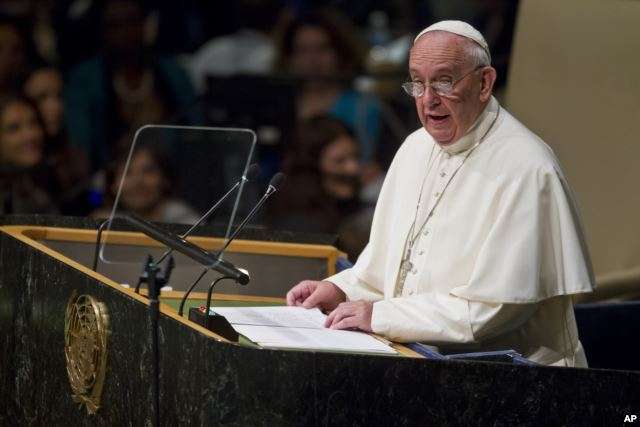The Papal Visit: A Religious Observer for the Sustainable Development Goals
On this blog, Sarah Ireland recently discussed the implications of the Papal visit to Cuba and what to expect during his visit to the United States. His Holiness Pope Francis, as the visible head of the Catholic Church, spoke to various constituents and the public on the current issues we face today. He addressed Congress, calling on their responsibility to enable this country to work for the common good. He held mass in cathedrals and Madison Square Garden. He opened the United Nations General Assembly Sustainable Development Summit; the fifth time a Pope has addressed the UN. His visit not only reaffirmed the Catholic community but became a symbol for events that would have no importance if he had not come.
The leaders of sovereign territories have the privilege of addressing the UN General Assembly during active sessions. The Pope is no different, as he serves as the head of state for Vatican City. However, this is not to be mistaken with the Holy See, which he serves in his role as the Pope. The Holy See holds a Permanent Observer Status at the UN, the World Trade Organization, and various NGOs. The Holy See holds governance over the Catholic community but is not necessarily the holiest site for Catholics, in comparison to Mecca, which is considered the holiest city in Islam. It truly captures how religion has worked as a government and is unique in its conception as a result of the Lateran Treaty. Because its governance is based on religious tradition, its judicial system for example holds normal cases as well as those ranging from annulment of marriages to granting indulgences. Their finances are accounted for and based on donations or assets. The Vatican City operates as a normal government, where the Pope also holds the position of Bishop of Rome, as bishops lead the diocese of that city.
As a Permanent Observer to the UN, the Holy See can participate in the same activities that member states are involved in with the exception of voting on resolutions. A Permanent Observer is given the opportunity to be neutral but not silent. Palestine is the only other state to have observer status, which could explain why their recent resolution was able to pass. For the first time, the flag of the Holy See was raised this weekend in time for Pope Francis’ arrival. Observer states that maintain missions at the UN Headquarters could have their flags raised after the flags of member states. Perhaps the significance of the Pope’s visit created enough of a push for the resolution to pass despite the United States and Israel to be among those who voted against it. Pope Francis has also pushed boundaries this past summer by signing an agreement with Palestine that recognized and supported the Palestinian state.
In his address at the UN, not only did the Pope call for leaders to take responsibility for their actions, but to address their actions in relation to the Sustainable Development Goals (SDGs). What makes these different from the Millennium Development Goals is that both developed and developing nations are called to be sustainable. Instead of marking success by a decrease in a statistic, these goals aim to be more direct in eliminating poverty, hunger, and inequality. There is a sense of community and responsibility when there is room for improvement for everyone and there is room for countries to work together to achieve these goals. In his speech, Pope Francis addressed a number of the SDGs. He addressed the need to protect the environment because we live in it and otherwise we create inequality by our abuse of the environment. He supported the total elimination of nuclear weapons and quoted the UN Charter on “saving succeeding generations from the scourge of war”. Surprisingly, he was in favor of change and reform in the UN, as many countries want change in the Security Council and its Permanent Five Members. One quote that was memorable was his call to resist in a “declarationist nominalism”. Perhaps the translator was more superfluous with his choice of words, but the Pope’s underlying theme of his speech was a call for responsibility instead of blame. We declare what should be the examples to the world, but if we are not willing to take responsibility for our actions and help those fuel that change, there will continue to be that nominalism. The Papal visit reminded us that the pudlicis watching, the world is watching, and now is our time to take action.
—
Sarah Valero is the Social Media Manager for the Journal of Diplomacy. She is a second year graduate student at Seton Hall’s School of Diplomacy and International Relations specializing in International Law/ Human Rights and the Asia Region.
Follow the Journal of Diplomacy on Twitter at @JournalofDiplo


All points voiced by the Pope hold true in today’s times. We all just need to be careful in how we interpret his message.